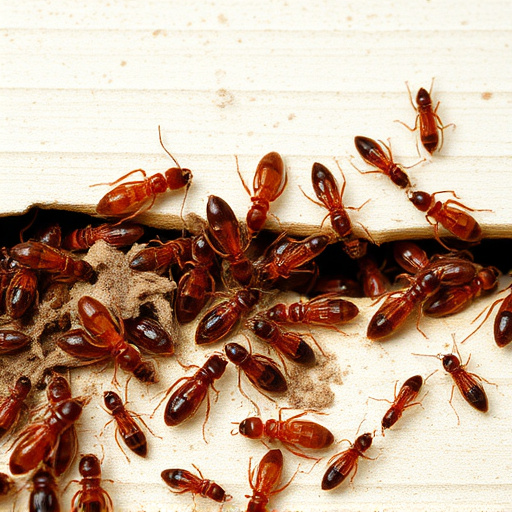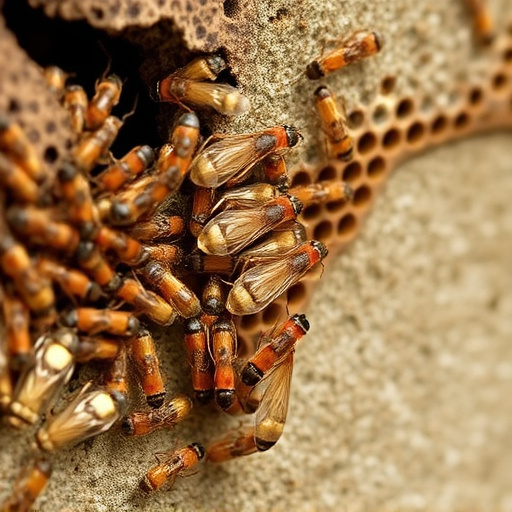In Tucson, Arizona, understanding termite behavior is crucial for prevention due to the pests' preference for cellulose-rich materials and favorable local conditions. Early detection through regular inspections (every 3-6 months) identifies signs like mud tubes, wood damage, or swarmer activity. Termite control involves professional treatments and home maintenance practices, such as addressing entry points, sealing cracks, repairing leaks, maintaining proper indoor humidity levels, and landscaping modifications. Natural strategies, including beneficial insects and plant-based repellents, offer eco-friendly alternatives. If signs of termites appear, call licensed termite control services in Tucson for accurate inspections and tailored treatments.
Tucson homes face unique challenges when it comes to termite prevention due to the region’s climate. Understanding these pests’ behavior is crucial for effective protection. This guide explores top tips for maintaining a termite-free environment, from early signs of infestation recognition to natural deterrents and professional interventions. Regular inspections play a pivotal role in Tucson’s termite control, allowing for swift action. Discover proven methods to safeguard your home and learn when professional termite control services are necessary for optimal protection.
- Understanding Termites and Their Behavior in Tucson
- Identifying Signs of Termite Infestation Early On
- Top Preventative Measures for Termite Control in Tucson Homes
- The Role of Regular Inspections in Maintaining a Termite-Free Environment
- Natural and Eco-Friendly Methods to Deter Termites
- When to Call Professional Termite Control Services
Understanding Termites and Their Behavior in Tucson

In Tucson, termites are a common pest that can cause significant damage to homes if left unchecked. Understanding their behavior is key when it comes to prevention. Termites feed on cellulose-rich materials, often found in wood structures and plant debris, making Tucson’s environment ideal for their proliferation. They live in colonies with complex social hierarchies, where workers forage for food, soldiers defend the nest, and kings and queens reproduce.
Regular inspections are crucial for early detection of termite activity. Homeowners should look out for signs like mud tubes (termites’ highways to their hidden nests), wood damage or swarmer activity, as these indicate potential infestations. Termite control in Tucson involves both professional treatments and home maintenance practices. By understanding the local conditions that attract termites and implementing preventive measures, residents can protect their homes from these relentless pests.
Identifying Signs of Termite Infestation Early On

Early detection is key in the battle against termites. Residents of Tucson, known for its warm climate, should be vigilant as these pests are attracted to moist wood and can quickly establish colonies. Regular inspections are essential; look for signs like weakened or damaged wooden structures, visible tunnels, or discarded wings near entry points. Termite control in Tucson isn’t just about addressing an active infestation; it’s proactive.
Property owners can enhance their defenses by ensuring proper drainage around the house, repairing leaks, and sealing any cracks or gaps where termites might enter. Regular professional inspections are also beneficial, as they can identify subtle signs of an impending invasion, allowing for timely termite control measures before the problem escalates.
Top Preventative Measures for Termite Control in Tucson Homes

In the hot, arid climate of Tucson, Arizona, homeowners face unique challenges when it comes to protecting their properties from termites. The best strategy for termite control in Tucson homes involves proactive measures that address the specific environmental conditions that attract these pests. One of the most effective preventative steps is regular professional inspections. Termite control experts can identify potential entry points and signs of an existing infestation early on, which significantly improves the chances of successful treatment.
Additionally, maintaining proper humidity levels indoors is crucial. Termites are drawn to moisture, so keeping basements, attics, and crawl spaces dry is essential. This includes addressing any leaks promptly and ensuring adequate ventilation in these areas. Landscaping modifications can also deter termites; avoid planting trees or shrubs directly against the house, as this provides easy access to wood structures. Regularly trimming back foliage and maintaining a clear physical barrier between your home and the surrounding environment is a top preventative measure for termite control in Tucson homes.
The Role of Regular Inspections in Maintaining a Termite-Free Environment

Regular inspections are an integral part of any effective termite control strategy in Tucson homes. Professional termite inspectors have the expertise and tools to detect even the subtlest signs of an infestation, such as mud tubes or wood damage. These inspections should be conducted periodically, typically every 3 to 6 months, depending on the age of your home and local conditions.
By scheduling regular checks, you can identify potential entry points and take proactive measures to prevent termites from establishing a colony. Early detection is key in termite control Tucson; addressing issues promptly can save you from extensive and costly damage repairs later. It’s a smart step towards maintaining a termite-free environment that protects your investment and keeps your home safe.
Natural and Eco-Friendly Methods to Deter Termites

In the quest to prevent termites in Tucson homes, natural and eco-friendly methods offer a compelling alternative to traditional chemical-heavy termite control. These strategies focus on harnessing the power of nature to deter and eliminate these pests while minimizing environmental impact. One effective approach is introducing beneficial insects like certain species of ants and predators that naturally feed on termites. By encouraging these insect populations, homeowners can create a natural balance that disrupts termite feeding and reproduction cycles.
Additionally, using plant-based repellents and essential oils known for their antimicrobial properties can be a game-changer in termite control Tucson. Lemon grass, neem oil, and cedar wood chips are examples of organic materials that repel termites due to their strong scents. Implementing physical barriers like metal or mesh screens around the foundation and sealing entry points can also prevent termites from accessing homes. These eco-friendly methods not only protect properties but also contribute to a healthier, more sustainable environment.
When to Call Professional Termite Control Services

If you notice signs of termites in your home, such as mud tubes, wing fragments, or wood damage, it’s time to consider calling professional termite control services in Tucson. Termites can cause significant structural damage if left untreated, and their presence is often difficult to detect until the problem has escalated. A professional inspection is crucial for accurate identification of termite activity and determining the extent of any existing infestation.
Hiring licensed termite control experts in Tucson offers several benefits. They have the necessary equipment and knowledge to locate hidden termites and implement effective treatment plans, including targeted pesticides, bait systems, or non-chemical methods. Regular monitoring and maintenance are essential to prevent future infestations, and professionals can provide tailored solutions that meet your home’s unique needs.
Protecting your Tucson home from termites starts with understanding their behavior and taking proactive steps. By identifying signs early, implementing top preventative measures, and scheduling regular inspections, you can maintain a termite-free environment. Remember, natural deterrents are available for an eco-friendly approach, but for severe infestations, professional termite control services in Tucson are essential for effective elimination and long-term protection.
